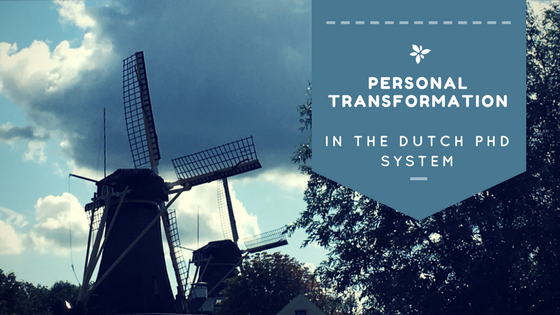Behind the scenes: the world in which PhD candidates live
Prof. Lou de Leij and dr. Marjan Koopmans initiated the PhD discourse on the Dutch science news- and blog-site scienceguide.nl. In their contribution Dr. Ingeborg Meijer and dr. Inge van der Weijden ask about the world in which PhD candidates are working and living. I think this is a very good question to ask. I am glad to take their line of thinking a few steps further in this reflection.
We want a PhD degree to guarantee
- that the person carrying this title is able to do independent, scientific research and
- that this person is widely employable as knowledge worker
Both on scienceguide.nl and on many blogs all over the world much is being said on the external world in which PhD candidates live. Just to mention a few of the commonly identified factors in the external life world of PhD candidates:
- the lack of training opportunities for PhD’s directed at improving their chances at a non-academic career (here)
- faulty frameworks in law and regulations (for example here and here)
- the status quo concerning the worrying conditions of mental health and wellbeing of PhD’s (here, here and here)
- the obstacles within univerisity organisational structures to improve this (e.g. this, this, and this)
What has not received sufficient attention so far, is the inner life of PhD candidates. This is a serious lack, because this inner life has far reaching impact on both the mental wellbeing of PhD’s and on their profile on the academic and non-academic jobmarket.
This inner life world of PhD candidates features a personal process that is a crucial aspect of doing a PhD. A PhD is — besides a training as independent researcher, a specialist education, and a masterpiece that qualifies you to become an acknowledged member of the academic guild — also a personal transformation. In your PhD research you reach for the limits of what is known to add something new, something previously unknown, to your discipline — however small and modest it may be. On this ‘border of the known’ you are thrown back on yourself to take a step into the unknown. Everyone who has done a PhD knows this, but it is hardly ever openly talked about. Any structured guidance in this disorienting fact is absent from universities and other research institutions. How helpful is the context in which PhD’s navigate this transformation? What support can they expect? What does this do to their self-awareness and confidence?
Cold Comfort
Whether the job market consists of the university, government, industry, or non-profit sectors: in order to truly demonstrate her value a newly minted PhD needs more than just analytical skills, specialist knowledge of her discipline and a bunch of transferable skills. In a smart knowledge economy we rightly expect a lot of innovative power from these highly educated, talented people. But only when PhD’s use and phrase their talents freely does their full potential become visible and available.
- When they are self-aware and confident enough to be proud of their successes.
- When they are trusted to move independently beyond the familiar paths.
- When they are allowed to take risks and make mistakes.
How can our excellent students who are brave enough to start a PhD learn all of this within the existing academic structures and cultures? You cannot learn this by taking a course here and there, or doing a professional internship like the Professional PhD Program (although these are definitely meaningful activities).
The infamous master / journeyman relationship between supervisors and PhD’s in the guild of academia is a substantial risk in this proces. So much is obvious.
“If you hint that you are considering a career outside academia, they take this as an indication that you are not fully committed. A supervisor will be less inclined to take time for you.”
As long as I regularly encounter statements like this from PhD candidates and PostDocs in my coaching practice for academics, there is ample room for improvement. This ball is in the professors’ court.
Are supervisors to blame then? Hardly! After all, most supervisors were never adequately trained to guide PhD candidates. The only thing you might blame supervisors for, is if they should persist in running their own business and not accept help in guiding our future independent researchers who work with them (cf. De Leij and Sally Wyatt previously on Scienceguide).
Moreover, this touches on an issue that is much bigger than just the PhD discourse. After all, science is directly held accountable for demanding performance criteria. Supervisors are painfully aware of that, as is evident from recent reactions from prominent academics on new government plans in the Netherlands (e.g. NRC and this petition). Who can indulge in unconditional, free thought? Who can really move beyond the well trodden paths and truly innovate? Which academics are genuinely free to make mistakes and learn? The professional honour of academics is at stake.
This context offers PhD candidates a meager array of role models and support structures on their way to self-awareness, confidence, independent and critical thought.
Side-effects of specialist topresearch
On top of this the process of learning how to do specialist scientific research itself is an inherent risk to the inner life of PhD candidates, and consequently to their mental health and wellbeing, their power to innovate, and their flexible employability. After all, one of the core requirements for good scientific research is an a priori critical, skeptical attitude towards findings, analyses, and conclusions. In the Netherlands, PhD’s appear to receive excellent training in this respect (cf. Lou de Leij on the main activity within a PhD project). But if you develop this quality skill to top level, you tend to apply it not just to the content of your research but everywhere, including your professional and personal development.
Of course there is nothing wrong with taking a critical look at your own functioning. To the contrary, and there are counless examples to be found in the news showing the derailment when this kind of selfreflection is absent. However, many early career researchers overshoot this type of critical thinking. It becomes impossible to feel and act like the expert they become or already are. You are no longer capable of celebrating your successes and mistakes make you freeze. You start doubting yourself. You identify your sense of worth with the success of your research. We all know research success is fickle, so with this way of thinking you seriously undermine yourself and thoroughly take apart your confidence. You start spiraling downward and your mental wellbeing suffers: stress, anxiety, depression are not far off. The path to personal and professional development is blocked and transformation impossible.
The hypercritical communication culture that is the norm in academic circles intensifies these dynamics. Often, critics deliver their views rather bluntly and you are supposed to take it stoically and adapt or defend your position accordingly. Compliments are few and far between. While this might be necessary to uphold a certain academic rigour and quality in the research itself, it seriously endangers the personal development of a budding independent researcher.
It is hardly surprising, then, that very talented early career academics with impressive CV’s feel inadequate, unprepared and short of opportunities even after four years of experience in a successful PhD project. Or in even stronger terms: that they feel like a personal failure in view of the lack of career perspectives and jobs they dreamt about within academia.
This is a tragic state of affairs. Doing a PhD is not just conducting specialist, scientific research and delivering a thesis-product. Nor is it merely an expensive training to become a flexible, employable knowledge worker. Let us take into account the personal transformation that doing a PhD also entails. Let us cherish and support this transformation in every way. Because in a truly smart knowledge economy we rightly expect a lot of innovative power of these highly educated, talented people. For that they do need to be able to spread their wings.


New post (Behind the scenes: the world in which PhD candidates live) has been published on Van Sijl Counseling &… https://t.co/hP6dMan24B